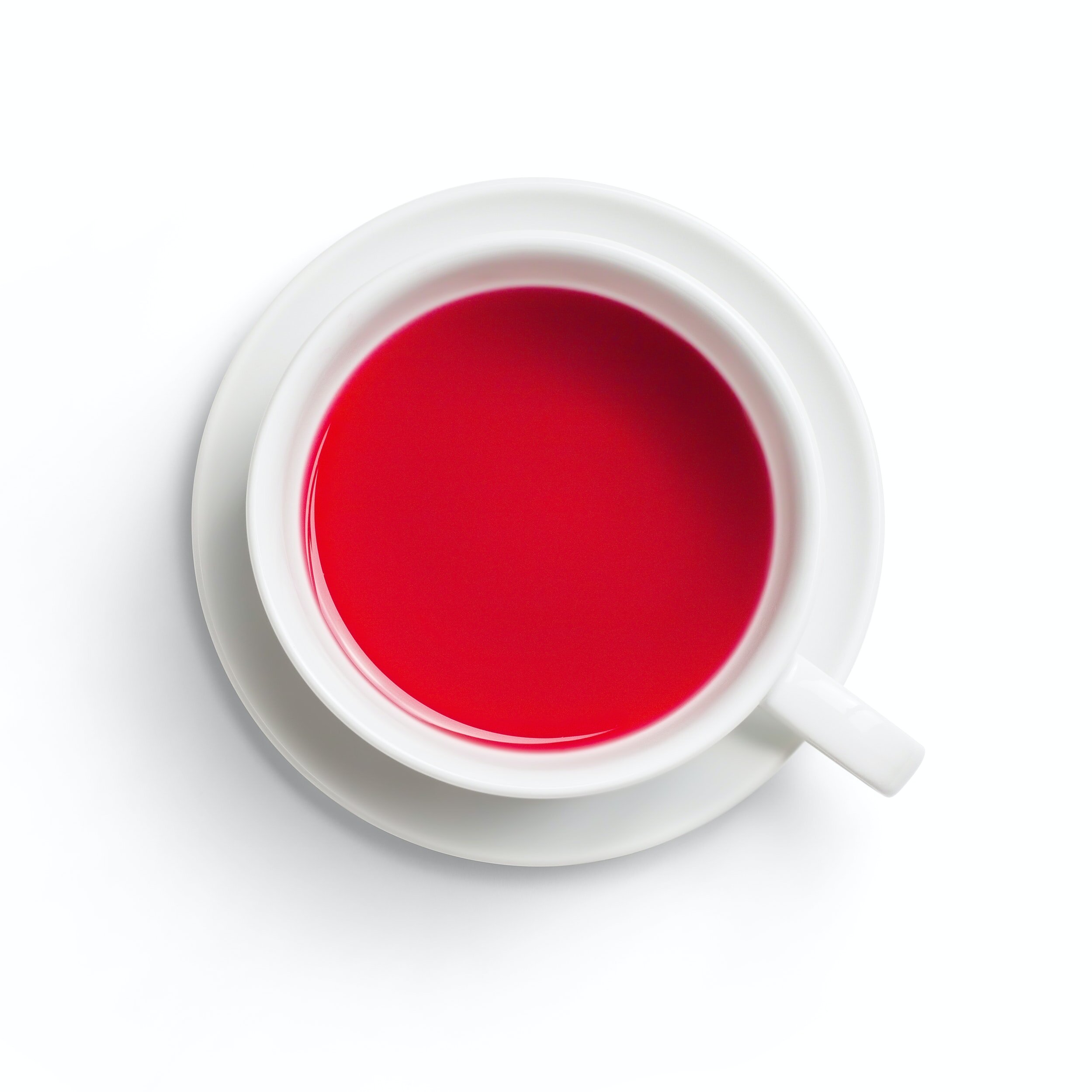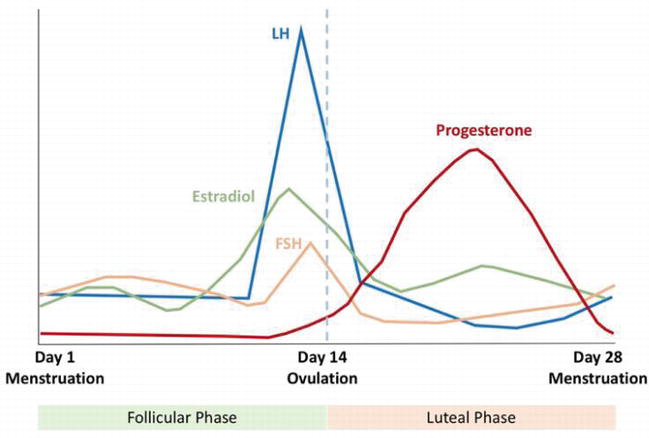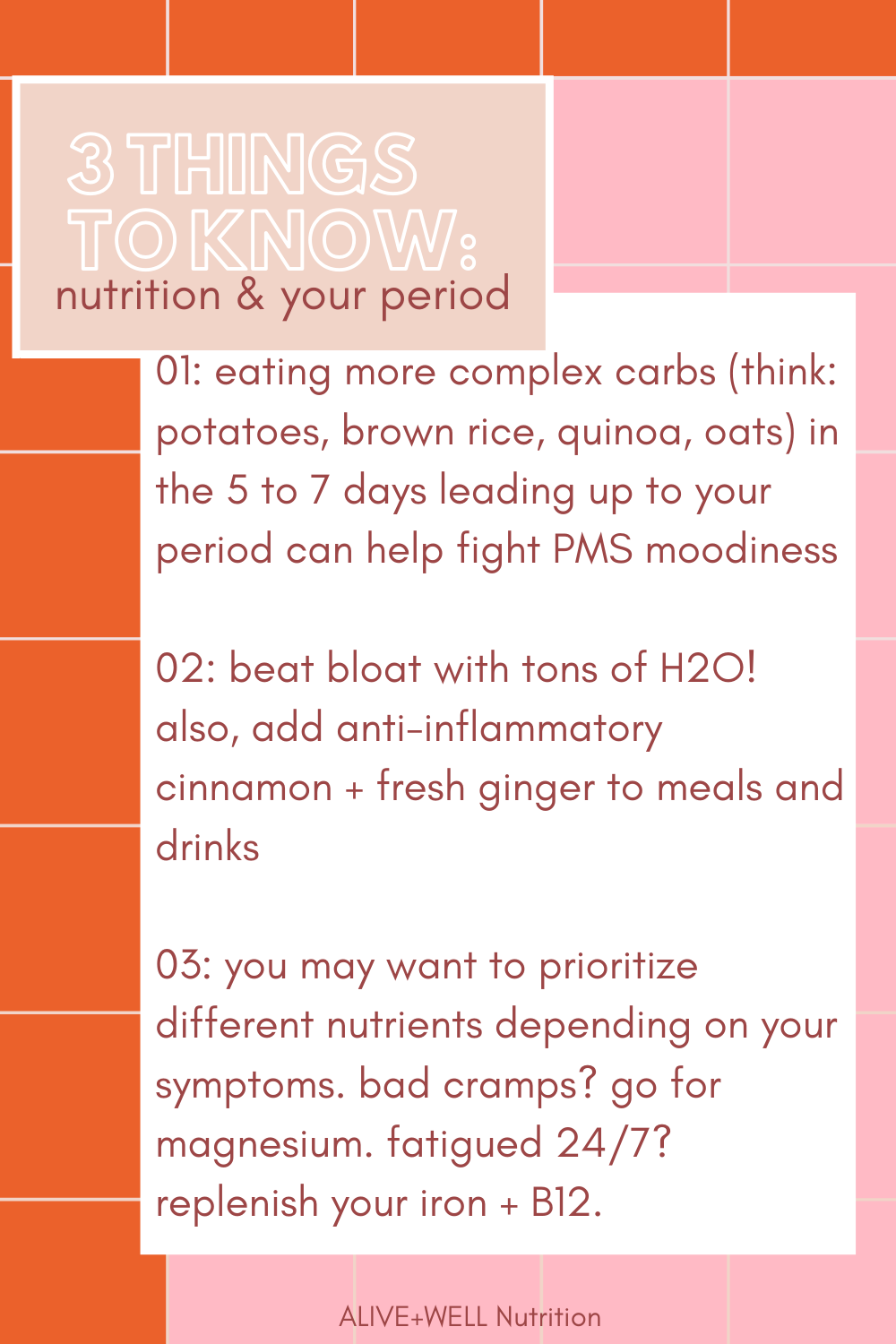3 Things to Know About Nutrition & Your Period
When it comes to your period, there’s a lot to consider. Is my cycle “normal”? Is my PMS getting worse? Does X symptom mean my hormones are out of whack? And then, there are the cravings. The bloat. Headaches. Weird poops. Fatigue. It’s really a mixed bag full of fun, is it not?
Because we specialize in the food stuff at ALIVE+WELL Nutrition, this blog post will answer three basic questions about diet & your menstrual cycle. Because you deserve to know why it’s really ok to eat extra carbs for a few days each month.
01: How does my cycle affect my appetite?
There are some very real reasons why you may feel hungrier during the second half of your cycle (i.e. from around day 15, after you ovulate, to around day 28, right before your period starts).
First, the hormone progesterone rises during this second half of your cycle, AKA the luteal phase. What does that have to do with hunger? Progesterone is thought to potentially heighten appetite.
Second, when estrogen levels drop towards the end of this phase, so do levels of the neurotransmitter serotonin, which acts as a mood stabilizer. Since eating carbohydrates supports serotonin production in the brain, you may find yourself feeling like you need extra carbs in the days leading up to your period.
Third, you’re likely to feel extra nosh-y because of what your body is actually doing during this time. Think about it: during the luteal phase, the body is quite literally building up extra uterine lining to potentially support a fertilized egg (pregnancy). While research doesn’t show a significant uptick in the number of calories burned as a result, it’s safe to assume the body requires adequate energy to sustain these essential processes. Translation: don’t beat yourself up if you’re feeling hungrier than usual + eating more during this time of the month.
WHAT TO KNOW:
If you’re craving a cookie, have it. Feeling like you need all the carbs is not a failure of willpower — it’s a physiological response to hormonal changes that are happening in the body.
Also, eat foods that will support your brain’s serotonin production, especially in the 5 to 7 days leading up to your period. Adequate serotonin levels will not only help fend off PMS moodiness, but also drive down carb cravings.
Choose high-quality complex carbs like potatoes (white, sweet, or purple are all great choices), as well as whole grains like brown rice, quinoa, oats, and whole wheat breads. Even better, pair these carbs with a source of tryptophan (found in egg whites, peanuts, turkey, chicken, cheese + milk) for optimal serotonin production.
Source; InTechOpen
02: i’m always gassy + bloated on my period. What should i eat?
There’s no right answer here, mostly because our digestive systems are so unique. What works for one person can trigger gas and bloat in another. Also, your diet isn’t actually to blame when it comes to cycle-related bloat. As I recently learned from this amazing podcast with the queen of women’s hormone health, Aviva Romm, totally normal (read: unavoidable) changes in estrogen levels can bring on bloat. That said, there are some choices we can make to prevent bloat from getting even worse.
WHAT TO DO:
Avoid ultra salty foods (think: high-sodium cheeses, packaged snack foods, canned soups, frozen meals) when bloat gets bad. Salt increases water retention, meaning it can exacerbate bloating.
If your bloat is due to constipation, go for fiber. Leafy greens, fruits with skins on (think: unpeeled apples), berries, nuts + seeds, and whole grains can help get things moving right along.
There’s no harm in adding anti-inflammatory ingredients like cinnamon and fresh ginger to your meals, but don’t count on them as magic bloat bullets.
It sounds counterintuitive, but drink tons of H20. Doing so supports movement through the GI tract (and is especially important if you’re adding in more fiber, as recommended above). Squeeze in some lemon juice for extra flavor. *P.S. Avoid bubbles like those found in club soda and seltzer — they can exacerbate gas + bloating for some.
03: Are there specific nutrients i should prioritize?
Actually, maybe yes. Which vitamins and minerals you should focus on depends on your primary complaint. Moody AF? Research shows that inadequate levels of calcium and vitamin D may make PMS symptoms worse. Have horrible cramps? Magnesium, which can help muscles relax, may soothe the menstrual pains. Also, replenishing iron and B12 stores can be critical with significant blood loss. Adequate levels of these nutrients are also helpful for fighting fatigue.
WHAT TO EAT:
Calcium: dairy (yogurt, cow’s milk, cheese), collard greens, bok choy, kale, almonds, dried figs, fortified tofu, canned salmon or sardines with the bones
Vitamin D: fatty fish (salmon, mackerel, trout, sardines), eggs (including the yolks), fortified milks and cereals, safe exposure to sunshine!
Magnesium: spinach, pumpkin seeds, cashews, avocado, dark chocolate, black beans
Iron: animal proteins (beef, chicken, turkey), spinach, oysters, lentils
B12: animal proteins (beef, chicken, turkey), fish (salmon, tuna, clams), eggs, fortified tofu and soy milks



